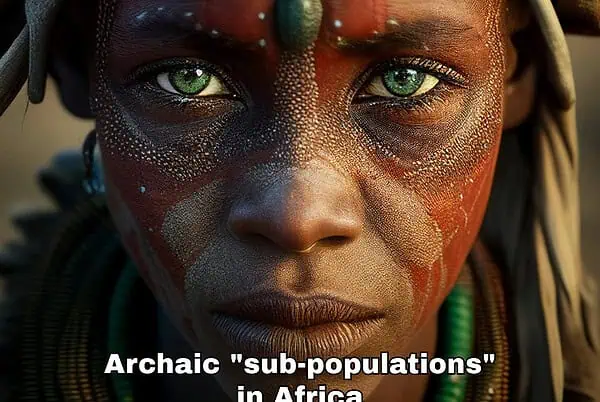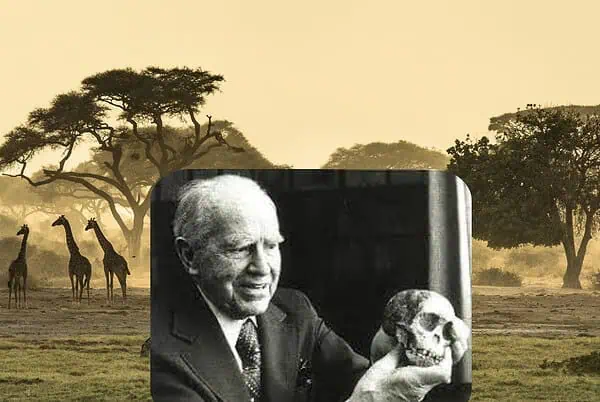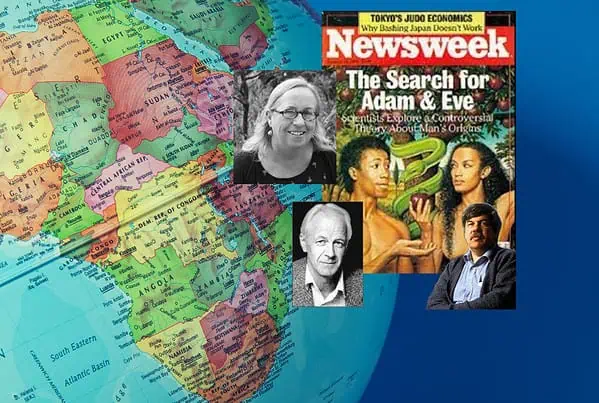John Hawks, along with 50 other top biologists, geneticists and paleo-anthropologists co-signed a letter condemning Sci-American editor Laura Helmuth and article author Monica McLemore
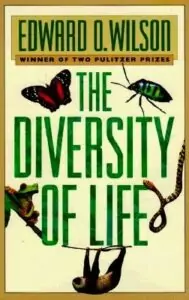 Famed biologist and wildlife protector E. O. Wilson died over the Christmas season.
Famed biologist and wildlife protector E. O. Wilson died over the Christmas season.
From our piece here at Subspecieist, Dec. 27:
Wilson died peacefully at his home in Burlington, Massachusetts. He was 92.
Wilson authored numerous best selling books, including, the highly acclaimed “The Diversity of Life” published in 1992, with an updated version in 1999.
Wilson was a passionate naturalist from an early age. Wilson had a horrible fishing accident as a child. Spines from a fish he had caught on a pier in Florida, pierced his eye. It left him blind in the one eye for life.
Wilson advocated for a life philosophy sometimes called biophilia, which describes man as having an innate attachment to the natural state. He was even labeled by the media, “Darwin’s natural heir.”
Additionally:
Wilson was the father of Sociobiology, often viewed as a precursor to the Evolutionary Psychology movement popular among anthropologists like Stephen Pinker, and including friends of this site, such as Dr. Edward Dutton (“Jolly Heretic), Dr. Noah Carl formerly of Cambridge Univ., Canadian biologist J.F. Gariepy, and anthropologist Steven Sailer.
Wilson accused of racism
 Wilson was attacked starting in the 1970s when he pushed back against leftism invading the fields of anthropology and biological science. He snarked at his former colleagues, noted leftist anthroplogists Stephen Jay Gould and Richard Lewontin, “communism, great idea; wrong species.”
Wilson was attacked starting in the 1970s when he pushed back against leftism invading the fields of anthropology and biological science. He snarked at his former colleagues, noted leftist anthroplogists Stephen Jay Gould and Richard Lewontin, “communism, great idea; wrong species.”
College anarcho-communists protested his remarks, even dumping a bucket of water on his head at one lecture. They charged that Wilson’s sociobiology philosophy would promote racist ideals in society by acknowledging human variation, and genes influencing human behavior.
Three days after Wilson’s death, Scientific American picked up on the criticisms of his sociobiology from the 1970s and published this obituary by part-time college instructor from San Francisco Monica McLemore. The former nurse called Wilson a racist for acknowledging genetic diversity in the human genome.
The Complicated Legacy of E. O. Wilson: We must reckon with his and other scientists’ racist ideas if we want an equitable future
With the death of biologist E.O. Wilson on Sunday, I find myself again reflecting on the complicated legacies of scientists whose works are built on racist ideas and how these ideas came to define our understanding of the world… Wilson was hardly alone in his problematic beliefs. His predecessors — mathematician Karl Pearson, anthropologist Francis Galton, Charles Darwin, Gregor Mendel and others — also published works and spoke of theories fraught with racist ideas…
Enter “the world’s best known genomics blogger” Razib Khan
 Razib Khan, leans conservative and has a reputation for being a fearless maverick in the genomics and paleo-anthropology fields. Khan co-hosted a podcast for many years with geneticist Spencer Wells, star of the early 2000s PBS series “Journey of Man.” Khan and Wells had many prominent guests on their shows, including John Hawks, Lee Berger and Chris Stringer.
Razib Khan, leans conservative and has a reputation for being a fearless maverick in the genomics and paleo-anthropology fields. Khan co-hosted a podcast for many years with geneticist Spencer Wells, star of the early 2000s PBS series “Journey of Man.” Khan and Wells had many prominent guests on their shows, including John Hawks, Lee Berger and Chris Stringer.
Khan himself was accused of racism and being affiliated with the “alt-right.”
From Politico, 2015,
New York Times drops Razib Khan
Razib Khan, a science blogger and a doctoral candidate in genomics and genetics at the University of California, Davis…
Khan had a “history with racist, far-right online publications.” Khan wrote 68 posts for Taki’s Magazine, a publication founded by a “flamboyantly racist Greek journalist,” Trotter wrote. Khan also wrote a letter to VDARE, “a white nationalist website named after the first white child born in America, in which he discussed [an essay] concerning the threat of the United States becoming “more genetically and culturally Mexican.”
Wells defended his buddy in an interview with the Austin Monthly in 2018:
Razib Khan is certainly not a racist, though he has in the past written for publications that later became associated with the far right. I would characterize him more as a libertarian than anything else—he believes in free and uncensored rational inquiry, and in the current divisive political era that can sometimes get you in trouble. He’s an extremely well-read scholar with an encyclopedic knowledge of human population genetics and a talent for communicating it—that’s why he’s our director of scientific content.”
Khan took the initiative to draft a letter of rebuttal to Sci-American immediately after reading the Sci-American slam piece on Wilson.
Highlights of the letter as published in full at Substack, January 20,
Setting the record straight: open letter on E.O. Wilson’s legacy
To be candid, I felt their approach, probably perfectly standard in past decades, was wholly out of step with today’s dispensation, when attacks on science are legion, genuine fear of the social-media mob is rampant in academia and whole careers are “canceled” on a specious basis. Ignored long enough, the lie becomes canon.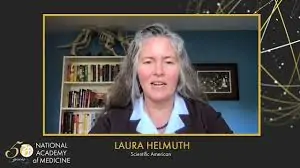
Differences of opinion are nothing new in science. Sadly, baseless accusations of racism aren’t either. Wilson negotiated plenty of each throughout his long career. A single 1981 instance where he defended himself and his science in the magazine Nature provides a striking contrast to today’s case. In response to a letter published in a previous issue suggesting his work gives cover to racists, Wilson penned his own calm, patient response, addressing the accusations with facts. Nature ran both letters.
Most of us can vividly recall a time when both journalism and science were robust enough to welcome, indeed require, the healthy airing of debates on important issues. Today, in contrast, contributors to a publication once dedicated to the diffusion of scientific ideas are deemed so sensitive their opinions cannot be directly discussed or debated. Not only that; their unvetted, ad hominem attacks are automatically newsworthy, based, one gathers, on the logic behind Helmuth describing her opinion section as for “authors such as Monica McLemore who are presenting their own experiences and analysis.”
Khan goes on to report that Sci-American editor Laura Helmeth rejected the letter for publication.
Today, after sitting on our rebuttal to Scientific American’s prominent reappraisal of Wilson for eight days (curious given that the original article was rushed out within three days of his death) editor-in-chief Laura Helmuth wrote to officially reject it. Scientific American avoids, she explained, “running direct rebuttals of earlier articles. This is a standard practice in most magazines to avoid being too self-referential, and so each article stands on its own.”
Khan says in the editor’s note at the end of the piece, that he recruited 50 signatories to the letter and could have gotten a bunch more.
Among the top signers, one of the world’s most respected paleo-anthropologist Dr. John Hawks of the University of Wiscsonsin. Hawks, a frequent YouTuber and lecturer, is most famous for his assistance with Lee Berger in the discovery and examinations of Homo naledi in South Africa. See John Hawk’s blog.
Hawks is quoted extensively at this website, acknowledging human variation and even speculating that Africans have Homo naledi admixture.
“People around the world today are enormously diverse. They behave in different ways. Some of the differences we see today are differences in anatomy. We look at people around the world and we see that they’re very diverse in the shapes of their skulls, in their height, and other aspects of their biology.”
Other prominent signers besides John Hawks include:
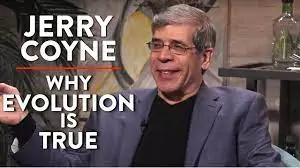 Dr. Hopi Hoekstra, Professor, Organismic & Evolutionary Biology and Molecular & Cellular Biology, Harvard University
Dr. Hopi Hoekstra, Professor, Organismic & Evolutionary Biology and Molecular & Cellular Biology, Harvard University
Dr. Hilary Martin, Group Leader, Wellcome Sanger Institute
Dr. Rosalind Arden, Research Fellow, London School of Economics
Dr. Jerry Coyne, Professor, Emeritus of Ecology and Evolution, The University of Chicago
Dr. Coyne in particular may be familiar to readers of this site. From our Race Realism Quotes page:
“Are there human races?
Yes. As we all know, there are morphologically different groups of people who live in different areas, though those differences are blurring due to recent innovations in transportation that have led to more admixture between human groups…
there are some genes (including the genes for morphological differences such as body shape, facial features, skin pigmentation, hair texture, and the like) that have not yet been subject to DNA sequencing, and if one looked only at those genes, one would obviously find more genetic differences.
Khan has since received support for his letter.
Well done, Razib. The Fall of Scientific American over several decades has been sad to watch. Glad to see you and others standing up for Wilson and scientific truth. — Jeremy Carl, Snr. Fellow, Claremont Inst.
The scientific level of this magazine has plummeted, hitting rock-bottom with an embarrassingly bad and ignorant piece about E.O. Wilson. This is a great rebuttal by several scientists who do know the work of Wilson. — Dr. Jente Ottenburghs (Twitter) Avian Hybrids Lecturer of Evolutionary Biology, Genomics and Ornithology
